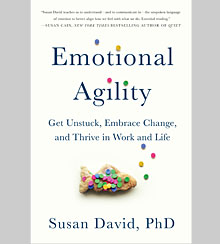strategy+business, November 23, 2016
by Theodore Kinni
The just-concluded presidential election has taught us Americans a lot about ourselves. One lesson it may have provided is about the efficacy of what Susan David, a psychologist on the faculty of Harvard Medical School, calls emotional agility.
Emotionally agile people are winners. “They demonstrate flexibility in dealing with our fast-changing, complex world,” David writes in Emotional Agility: Get Unstuck, Embrace Change, and Thrive in Work and Life (Avery, 2016). “They are able to tolerate high levels of stress and to endure setbacks, while remaining engaged, open, and receptive. They understand that life isn’t always easy, but they continue to act according to their most cherished values and pursue their big, long-term goals.” Although they experience feelings of anger and sadness, as all humans do, “they face these with curiosity, self-compassion, and acceptance,” she writes. “And rather than letting these feelings derail them, emotionally agile people effectively turn themselves — warts and all — toward their loftiest ambitions.”
Emotional agility is a kind of mashup of two concepts that are now popular among the corporate set: mindfulness and purpose. It is rooted in acceptance and commitment therapy (ACT), a psychotherapy approach dating to the 1980s that entails acknowledging emotional responses in a mindful way, without denial or overreaction, and then moving forward in a purposeful, value-driven direction. Read the rest here.
















No comments:
Post a Comment